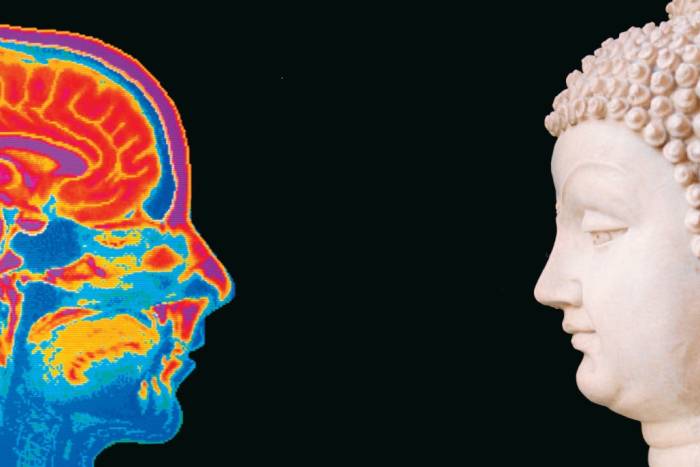Nihilist Optimism: Creating Your Life From Nothing (Video)
If the possibility that life is meaningless frightens you, check this out…
Although at first, it may be difficult to accept, life is likely to have no definite sense or purpose. The fact that this is difficult to accept is because we usually learn, or we’re taught to believe, otherwise. And it may even be that much of our lives are spent, even bent, on answering these questions: Why are we living? What is the meaning of life? Why did we come into this world? And to answer these questions to which we’ve attached such great importance with a rather blunt statement, we might say that there is neither a reason, nor a meaning, nor any purpose to life. We may even feel a certain vertigo beneath us, as if the ground we believe to be so real has suddenly dissolved. It’s into an infinite void we’re about to rush headlong.
But what happens if, for just a moment, we stop thinking about our falling, and we look at nothingness in some other way? If we stick to the physical and biological evidence, the truth is that life is an accident. Nietzsche realized this, and he wasn’t the only one. “In some remote corner of the universe, poured out and glittering among innumerable solar systems, there once was a star on which clever animals invented knowledge. That was the highest and most mendacious minute of ‘world history’—yet only a minute,” the philosopher wrote at the beginning of On Truth and Lie in an Extra-Mortal Sense. It’s worthwhile to notice the verb: “invented.” Everything for humanity is an invention and always has been. Insofar as no one has ever disputed these theories of the world and reality, we’ve spent all of human history believing them to be true, incontestable, as close, in theory, to the phenomena as are the phenomena themselves. It’s as if phenomenon and theory are one and the same thing.

Looking beyond this can be distressing, it’s true. But it can also be liberating. Realizing that everything human is a cultural and collective invention robs us of certain stability of thought and experience. But, looked at it in another way, it also gives us full acceptance of the possibility of creation ex nihilo. As when we’re faced with a blank page and in its nothingness, we can do as we please: draw, scratch, write, annotate, lay the foundations for a novel, compose two or three rhymes, sketch the house of our dreams … or just leave it blank.
That’s, in part, the idea of “nihilistic optimism” proposed in the video below and produced by the philosophical YouTube channel, Kurzgesagt. These two words, which seem so strange when seen together, in this light, become consistent.
Why not think of nothingness as the best possible context for the creation of something? If life has no meaning or purpose, isn’t it the best condition for inventing the conditions of our own lives?
Related Articles
Why shrinking the size of life is synonymous of well-being
One of the great misunderstandings regarding modern spirituality is that to achieve it requires many things: readings, food, exercise, travel, groups and techniques. But perhaps it should be suggested
What is energy medicine yoga?
Energy Medicine Yoga (EMYoga) is slightly different from other types of Yoga, but it provides the same benefits in addition to a few very specific ones. One of them is that it gives you much more in
Red tea, the best antioxidant beverage on earth
Red tea is considered to be the most unusual of teas because it implies a consistently different preparation process. ––It is believed that its finding came upon surprisingly when traditional green
Is the internet on the verge of self-awareness?
More than 50 years ago, Marshall McLuhan described technology as an extension of our brains, constantly mutating and branching out. “These new media have made our world into a single unit,” the
How art can help us to age, healthy
Perhaps many of us already well know the formula for aging in health and wellness. A balanced diet and, as much as possible, one that’s natural. Keep our brains active and stimulated. Preserve and
Earthanima: documenting the living language of nature
The basic intuition that the Earth is alive and that nature has a language through which it communicates with us is what prompted this wood-art project named Earthanima. For the past couple of years
Dialogue with the Dalai Lama on science and spirituality
The Dalai Lama has been interested in science since he was a child. Over the years he’s visited many laboratories and has attended conferences that discuss consciousness from the scientific point of
Brian Eno's literary recommendations to rebuild society
Artists and authors often get asked what books or records they’d take with them to a deserted island. On principle, this is naturally an extreme anthology: urgency and tragedy guide its selection. It
Bill Mollison, natural ideologue and father of permaculture
Permaculture has established itself as a path towards communitarianism, but one that is in full symbiosis with nature. In practice, it is more than just a combination of agriculture, horticulture
A New Year's resolution for the earth
Worrisome quantities of waste are generated by human populations. Especially in cities, these have reached unprecedented and alarming levels. A largely uncontrolled practice, it affects everything on










